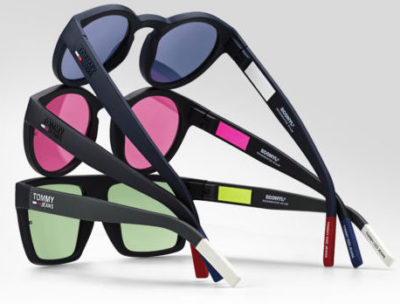I am loving this, more eyewear companies are getting into recycled eyewear and now Safilo, one of the top three eyewear manufacturers has gotten into the Eco Friendly Eyewear space. They join the ranks of Bureo, Coral Eyewear, Sea2Sea, Norton Point, Dresden Optical, Waterhaul just to name a few.

Padua, February, 2020 – Safilo, a worldwide leader in the design, manufacturing and distribution of eyewear, today announces the introduction of ECONYL® regenerated nylon in its eyewear collections, thanks to a pioneering partnership with Aquafil, a recognized global player with over half a century of expertise in creating synthetic fibres.
ECONYL® is a regenerated nylon obtained through the regeneration and purification process of plastic waste, such as fishing nets, old carpets, and fabric scraps. ECONYL®, obtained through a process of depolymerization and re-polymerization, performs exactly the same as brand new nylon and it can be recycled, recreated and remolded again and again, with no loss of quality.
The choice of this material is a tangible sign of Safilo’s further progression in its sustainability strategy and its commitment to bring innovation to a consolidated industry. “Our investment to using recycled materials highlights our continued efforts towards promoting a responsible business,” explains Angelo Trocchia, CEO of Safilo Group. “This sustainable material will allow us to make our contribution and create products without using new resources. Our intention is to expand the use of ECONYL® as much as possible in order to decrease our carbon footprint.”
“Safilo has a long history of creating high-quality eyewear products, and we are happy to partner with such a strong player in the eyewear industry,” said Giulio Bonazzi, Aquafil’s CEO. “It is a completely new sector in which our ECONYL® material is now used, and it is this pioneering spirit that most unites us with a company like Safilo, which, like us, has innovation in its DNA.”
The new TOMMY JEANS eyewear collection, recently launched by Tommy Hilfiger, one of the licensed brands in Safilo’s portfolio, is the first that features styles made of ECONYL® regenerated nylon.
Safilo will progressively introduce this material also in its other brands’ collections.
About Safilo Group
Safilo Group is a worldwide leader in the design, manufacturing and distribution of sunglasses, optical frames, sports eyewear and related products. Thanks to strong craftsmanship expertise dating back to 1878, Safilo translates its designs into high-quality products according to the Italian tradition. Through an extensive wholly owned network of subsidiaries in 40 countries and more than 50 distribution partners in key markets throughout North and Latin America, Europe, Africa, the Middle East, Asia Pacific and China, Safilo is committed to quality distribution of its products in nearly 100,000 selected points of sale worldwide. Safilo’s portfolio encompasses its own core brands Carrera, Polaroid, Smith, Safilo, Privé Revaux, and licensed brands Dior, Dior Homme, Fendi, Banana Republic, BOSS, David Beckham, Elie Saab, Fossil, Givenchy, havaianas, HUGO, Jimmy Choo, Juicy Couture, kate spade new york, Levi’s, Liz Claiborne, Love Moschino, Marc Jacobs, Max Mara., Missoni, M Missoni, Moschino, Pierre Cardin, rag&bone, Rebecca Minkoff, Saks Fifth Avenue, Swatch, and Tommy Hilfiger.
Listed on the Italian Stock Exchange (ISIN code IT0004604762, Bloomberg SFL.IM, Reuters SFLG.MI), in 2018 Safilo recorded preliminary net sales for Euro 939 million.
About Aquafil
Aquafil is a global company that produces polymers and synthetic fibers. Since 2011, as part of an ambitious circularity project, it has implemented a regeneration system where nylon waste, such as fishing nets, old carpets, and scraps are transformed into ECONYL® regenerated nylon. To date, this product represents more than one-third of the entire Aquafil’s production.
The ECONYL® ingredient is used by hundreds of fashion, carpet and home design brands in their creations. Through its direct presence in 8 countries and 3 continents, Aquafil has been able to activate a virtuous network of partners, along the value chain, which aims to pursue sustainability for each production activity, in the unceasing attempt to decrease the impact of human activities on the environment and the planet.
